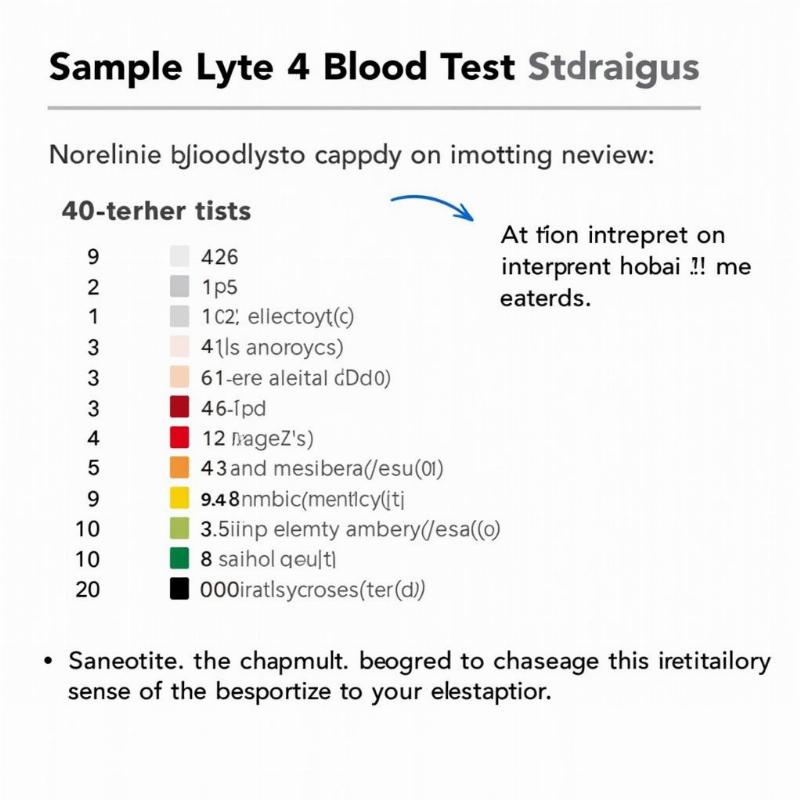The Lyte 4 blood test for dogs is a valuable diagnostic tool used by veterinarians across the US to assess a dog’s gastrointestinal health. Understanding what this test measures, when it’s recommended, and how to interpret the results can empower dog owners to proactively manage their furry friends’ well-being. This comprehensive guide will delve into the details of the Lyte 4 blood test, providing you with everything you need to know.
What is the Lyte 4 Blood Test?
The Lyte 4 blood test measures the levels of four key electrolytes in a dog’s blood: sodium, potassium, chloride, and bicarbonate. These electrolytes play crucial roles in maintaining hydration, nerve and muscle function, and acid-base balance. Imbalances in these electrolytes can indicate various underlying health issues, particularly those affecting the gastrointestinal tract. The test is often used to diagnose and monitor conditions like vomiting, diarrhea, and kidney disease.
When is a Lyte 4 Blood Test Recommended?
Veterinarians may recommend a Lyte 4 blood test if a dog exhibits symptoms such as persistent vomiting, diarrhea, lethargy, loss of appetite, or increased thirst. These symptoms can signal dehydration and electrolyte imbalances, which the Lyte 4 test can help identify. The test is also sometimes used as part of routine wellness checkups or pre-surgical screenings.
Interpreting the Results of a Lyte 4 Blood Test
Interpreting the Lyte 4 blood test results requires veterinary expertise. Each electrolyte has a normal range, and deviations from these ranges can signify specific problems. For example, low potassium levels (hypokalemia) can be caused by vomiting or diarrhea, while high potassium levels (hyperkalemia) can be associated with kidney disease. Similarly, abnormal sodium and chloride levels can indicate dehydration or other underlying conditions.
 Lyte 4 Blood Test Results
Lyte 4 Blood Test Results
The Importance of Veterinary Consultation
While this guide provides valuable information about the Lyte 4 blood test for dogs, it’s essential to remember that it should not replace professional veterinary advice. If your dog is experiencing symptoms that warrant a Lyte 4 test, it’s crucial to consult with your veterinarian. They can accurately interpret the results, diagnose any underlying conditions, and develop an appropriate treatment plan.
Conclusion
The Lyte 4 blood test for dogs is a powerful tool for assessing gastrointestinal health and identifying electrolyte imbalances. Understanding its purpose and interpretation can help dog owners make informed decisions about their pets’ care. Remember to consult with your veterinarian for any concerns about your dog’s health and to ensure proper diagnosis and treatment.
FAQ
- How is a Lyte 4 blood test performed? A small blood sample is drawn from your dog, typically from a vein in their leg.
- Is the Lyte 4 blood test painful for dogs? The procedure is similar to a routine vaccination and may cause only brief discomfort.
- How long does it take to get Lyte 4 blood test results? Results are often available within a few hours to a day.
- What are the normal ranges for electrolytes in dogs? Normal ranges vary slightly between laboratories but are generally provided with the test results.
- What are the treatment options for electrolyte imbalances? Treatment depends on the underlying cause and severity of the imbalance and may include fluid therapy, medications, or dietary changes.
- Can I perform a Lyte 4 blood test at home? No, the Lyte 4 blood test requires specialized equipment and veterinary expertise.
- How much does a Lyte 4 blood test cost? The cost varies depending on the veterinary clinic and location but is generally a relatively affordable diagnostic test. how much is a blood test for a dog
Quote from Dr. Emily Carter, DVM, Diplomate ACVIM (Internal Medicine): “The Lyte 4 blood test is a valuable tool in my practice. It provides crucial information for diagnosing and managing a variety of conditions, especially those related to gastrointestinal issues.”
Quote from Dr. Michael Davis, DVM: “Early detection of electrolyte imbalances is essential. The Lyte 4 test allows us to intervene quickly and effectively, often preventing more serious complications.”
dog trembling after throwing up
why would dog have blood in stool
dog acting drunk and peeing
how to make your dog eat when sick
Beautdogs.us is your trusted resource for comprehensive and engaging information on dog care, breeds, and lifestyle. We offer expert guidance on everything from nutrition and training to health and wellness. Whether you’re a new dog owner or a seasoned enthusiast, Beautdogs.us is here to support your journey with your furry companion. Contact us for personalized advice: Email: [email protected], Phone: +1 501-555-7529. Visit Beautdogs.us for more valuable insights!